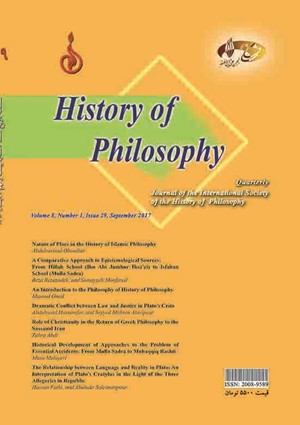The Relationship between Language and Reality in Plato: An Interpretation of Plato’s Cratylus in the Light of the Three Allegories in Republic
Subject Areas : Philosophical thoughts in ancient IranHassan Fathi 1 , Aboubakr Soleymanpour 2
1 -
2 -
Keywords: Plato reality Names Cratylus Republic allegory ,
Abstract :
Before Plato, the thinkers dealing with the problem of language viewed it as a dual phenomenon. In Aristotle’s eyes, language is a mysterious entity which functions not only as a link connecting the gods and human beings but also as a body of laws for revealing the truth. For Heraclitus, language enjoys a code-like aspect similar to logos, which is mainly a phenomenon referring to the truth rather than a tool for explaining and analyzing it. On the other hand, for Parmenides, language is a deceptive phenomenon which is the product of a kind of social contract as well as a problem in the sensible world which, by itself, is not of much value. Sophists also consider language to be an arbitrary and relative phenomenon which merely functions as a medium of speech and entails no absolute truth by itself. Given this historical background, Plato set out to explore the problem of language. He developed a view in Cratylus which completed the mentioned historical background. For him, language is a deceptive and imperfect phenomenon; a phenomenon which he investigated in Cratylus based on its essence and its relationship with reality. He maintains that, since language is an artificial entity, it is essentially imperfect and, hence, incapable of providing any knowledge regarding reality. He believes that language can only be used to reflect the reality as accurately as possible, is ontologically posterior to reality, and is only temporally prior to it in terms of its instructional feature. In other words, according to Plato, one cannot attain knowledge through language because it is an artificial phenomenon which, at its best, can manifest the reality in an imperfect form.
آزبرن، کاترين، تاريخ فلسفه راتلج، «هراکليتوس»، ترجمة حسن فتحي، تهران انتشارات حكمت، ج1، 1392.#
بورمان، کارل، افلاطون، ترجمة محمدحسن لطفي، تهران، انتشارات طرح نو، 1389.#
پاپاس، نيکلاس، کتاب راهنماي جمهوري افلاطون، ترجمة بهزاد سبزي، تهران، انتشارات حکمت، 1389.#
تاريخ فلسفه راتلج، ويراستاري س.س. وتيلو، ترجمة حسن فتحي، تهران، انتشارات حکمت، ج۱، 1392.#
درويشي، داريوش، فيلسوف تاريک، آبادان، انتشارات پرسش، 1391.#
کرفرد، جي. بي، تاريخ فلسفه راتلج، «سوفسطائيان»، ترجمة حسن فتحي، تهران، انتشارات حكمت، ۱۳۹۲.#
گاتري، دبليو. کي. سي، تاريخ فلسفه يونان، سوفسطائيان، بخش اول و دوم، ترجمة حسن فتحي، تهران، انتشارات فکر روز، 1375.#
گاتري، دبليو. کي. سي، تاريخ فلسفه يونان، هراکليتوس، ترجمة مهدي قوام صفري، تهران، انتشارات فکر روز، 1376.#
گمپرتس، تئودور، متفکران يوناني، ترجمة محمدحسن لطفي، تهران، انتشارات خوارزمي، 1375.#
يونسي، مصطفي، نسبت فلسفه سياسي و فلسفه زبان افلاطون. تهران، انتشارات فرهنگ صبا، 1387.#
Ademollo, Francesco, The Cratylus of Plato, a Commentary, Cambridge, Cambridge University Press, 2011.#
Coxon, A. H., The Fragments of Parmenides, Las Vegas, Parmenides Publishing, 2009. #
Denyer, Nicholas., Language, Thought and Falsehood in Ancient Greek Philosophy, London, Routledge, 1991.#
Duke, A. E. & Hicken, F. W. & Nicoll, M. S. W. & Robinson, B. D. ET Strachan, G. C. J. 1995, Platonis Opera, TOMVS I, Tetralogias I-II Continens, Recognoverunt Brevique Adnotatione Critica Instruxerunt, Oxford Classical Text, New York, Oxford University Press, 1991.#
Hamilton, edith and Cairns, Huntington., Plato, collected dialogues, Princeton, Princeton university press, 1989.#
Hornby, S. A. (Ed)., Oxford Advanced Learner’s Dictionary, Oxford, Oxford University Press, 2010.#
Liddell, George Henry & Scott, Robert. (Eds)., A Greek – English Lexicon. New York, Oxford University Press, Inc, 1996.#
Riley, W. Michael., Plato’s Cratylus, Argument, Form and Structure, New York, Value Inquiry Book Series, 2005.#
Ross, S.W.D., Plato's Theory of Ideas, Oxford, the Clarendon Press, 1966.. #
Schofield, Malcolm and Nusbaum, M.C. (Eds)., Language and logos, Studies in ancient Greek philosophy. New York, Cambridge university press, 1982.#
Taylor, A.E., Plato, the Man and his Work, London, Methuen & Co. LTD, 1955.#
Zeller, Eduard., Outlines of the History of Greek Philosophy, L. R. Palmer (Trns), New York, Dover Publications, Inc, 1980.#


